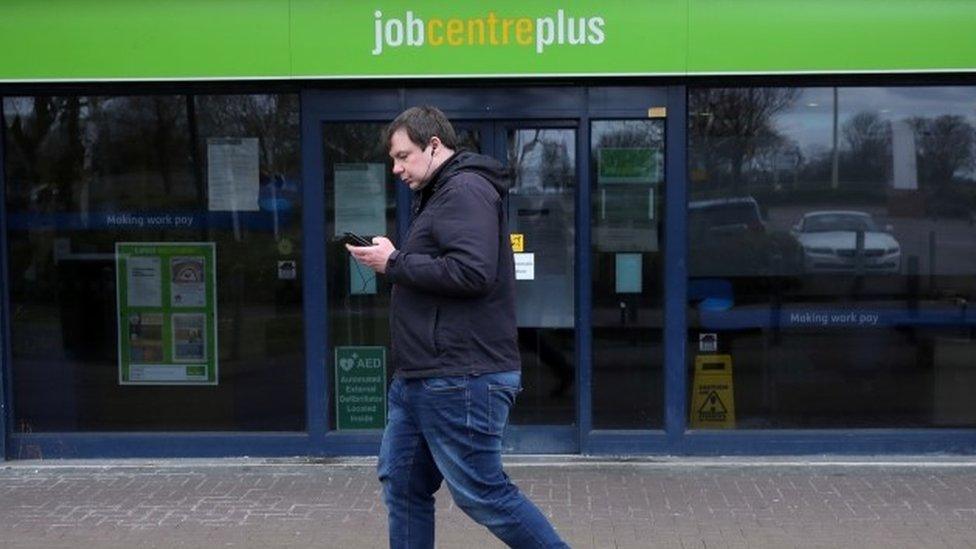Coronavirus: Nearly two million claim universal credit
- Published
- comments

The pandemic has led to the closure of job centres
Nearly two million people have applied for universal credit benefits since the government advised people to stay at home due to coronavirus.
Work and Pensions Secretary Therese Coffey said there had been more than 1.8 million claims since 16 March.
Ms Coffey told MPs that figure was six times the normal claimant rate, and in one week there had been a "tenfold" increase in claims.
She said about 8,000 staff had been redeployed to deal with the claims.
The figures show the growing increase in demand on the benefit system since the government urged people to avoid non-essential travel and contact with others to curb the spread of the virus.
Ms Coffey told MPs there had also been more than 250,000 claims for Jobseeker's Allowance and over 20,000 claims for Employment Support Allowance.
Advance payments
"Overall, this is six times the volume that we would typically experience and in one week we had a tenfold increase".
She said that the rate for universal credit had appeared to have stabilised at about 20,000 to 25,000 claims per day, which she said was "double that of a standard week pre Covid-19."
She added: "We've also issued almost 700,000 advances to claimants who felt that they could not wait for their routine payment and the vast majority of these claimants received money within 72 hours."
Universal credit is a consolidated monthly payment for those of working-age, which replaced a host of previous benefits including income-based Jobseeker's Allowance, housing benefit, child tax credit and working tax credit.
In October 2019, there were 2.6 million universal credit claimants - just over a third of whom were in work.
'Too many holes'
Labour's Jonathan Reynolds said the government needed to "widen the safety net" of support for everyone who needs it.
The shadow work and pensions secretary said: "The social security system we had going in to this crisis was a safety net with too many holes in it".
Mr Reynolds said that the amount universal credit claimants receive had been significantly increased since the lockdown began, but asked when people on legacy benefits such as Jobseekers Allowance would see the same increases.
He highlighted calls from charities and anti-poverty campaigners to temporarily suspend the benefit cap, which puts a limit on the overall amount working age families can claim.
And he said the two-child limit, which restricts the child element in universal credit and tax credits - worth £2,780 per child per year - to the first two children should be lifted.
New jobs website
"People three years ago could not have been expected to make family choices based on the likelihood of a global pandemic shutting down our economy," said Mr Reynolds.
"The government has suspended sanctions during the crisis but the two-child limit is effectively an 18-year sanction on the third and fourth child in a family and surely it should go too."
Mr Reynolds also said the five-week wait for the first payment of universal credit, another issue highlighted by charities as a cause of hardship despite the availability of advance loans, "should not exist at all".
And he raised concerns over the impact of universal credit on maternity allowance, warning it could result in a "low-paid pregnant woman being as much as £4,000 a year worse off".
MPs thanked front line staff for their work processing the unprecedented increase in the number of claims for support.
Ms Coffey said that average waiting times for calls to DWP helplines were "now below five minutes".
The work and pensions secretary also said a new government website, external had been set up to advertise new jobs, which had 58,200 vacancies on offer.
- Published8 April 2020

- Published1 April 2020